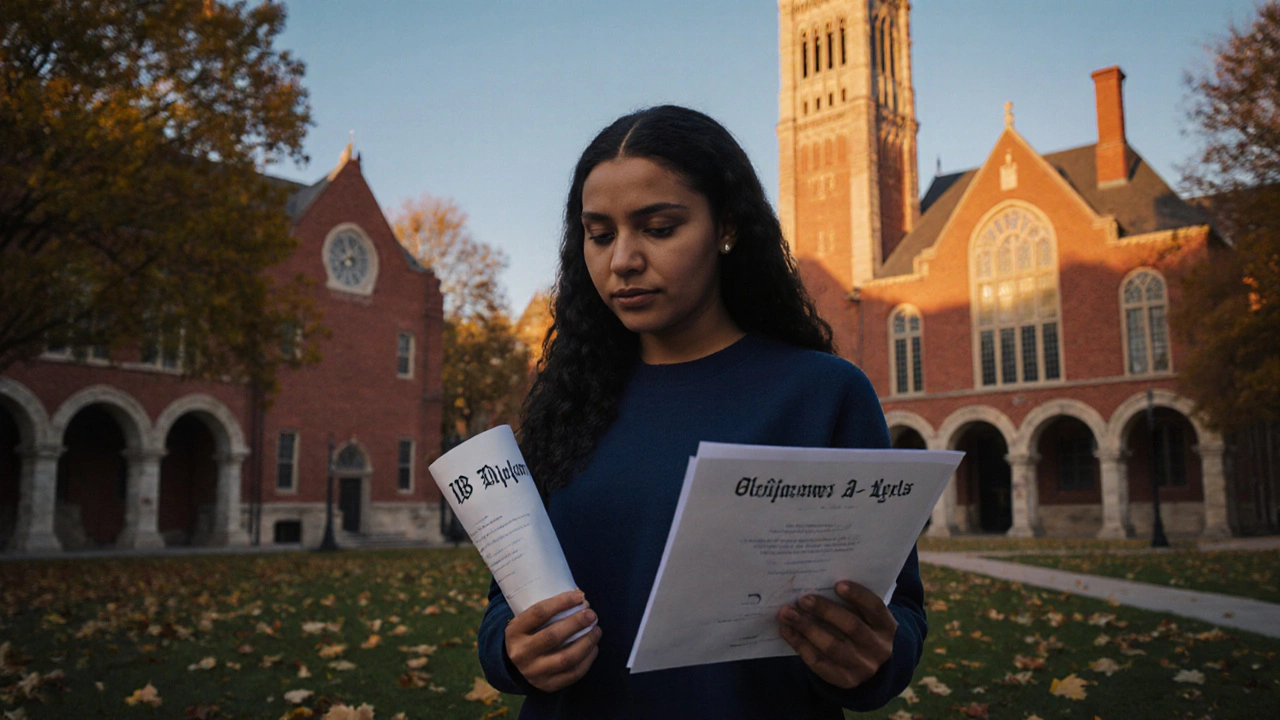When you’re eyeing Yale, the biggest question on many students’ minds is whether the International Baccalaureate (IB) or A‑Levels give you a leg up. The short answer: Yale doesn’t officially favor one over the other, but the way each program lines up with Yale’s expectations can make a big difference in how your application reads.
Key Takeaways
- Yale treats IB and A‑Levels as equivalent in rigor, but the IB’s breadth can showcase academic versatility.
- Top scores in core subjects (Math, Science, English) matter more than the specific curriculum.
- Standardised test scores (SAT/ACT) and strong extracurriculars remain critical, regardless of the qualification.
- Tailor your subject choices to match Yale’s preferred academic profile.
- Use the checklist below to make sure nothing slips through the cracks.
Yale University is a private Ivy League institution in New Haven, Connecticut, that admits a highly selective class each year. The school looks for academic excellence, intellectual curiosity, and leadership potential across all applicants.
How Yale Views the International Baccalaureate
International Baccalaureate (IB) is a globally recognised two‑year programme that culminates in a diploma based on six subjects, an extended essay, Theory of Knowledge, and CAS (Creativity, Activity, Service). Yale sees the IB diploma as a strong indicator of academic depth because it forces students to study subjects across languages, sciences, math, and humanities.
For Yale, the most important IB metrics are:
- Higher Level (HL) results: Yale looks for 6‑7 HL subjects, with top scores (5 or 6) in math, science, and English.
- Extended Essay: A well‑researched essay in a subject related to your intended major can serve as a mini‑research sample.
- Theory of Knowledge (TOK): Demonstrates critical thinking, a skill Yale values in its seminar‑style classes.
Because the IB is assessed on a 1‑7 scale, Yale typically converts a 5‑7 range to an A‑level‑equivalent of A to A+. Admissions officers compare your IB grades to the U.S. GPA system, treating a 6-7 as roughly a 4.0‑plus.
How Yale Views A‑Levels
A‑Levels are subject‑specific qualifications offered in the UK and several overseas schools. Students usually take three to four subjects over two years, each graded from A* to E. Yale evaluates A‑Levels primarily on the depth of study in each chosen subject.
Key points Yale looks for in A‑Levels:
- Subject relevance: A‑Levels in math, physics, chemistry, biology, and English literature are viewed most favourably for STEM and humanities majors.
- Grades: An A* or A in all subjects signals the academic strength Yale seeks. A single B may be offset by higher SAT/ACT scores.
- Number of subjects: While three A‑Levels are typical, taking a fourth can demonstrate additional rigor, especially if it’s an AP or IB subject.
Yale translates an A* to an approximate 4.0 GPA, A to 3.7, and B to 3.0, but the holistic review means strong extracurriculars can compensate for a lower grade.

Direct Comparison: IB vs A‑Levels for Yale Admission
| Aspect | International Baccalaureate | A‑Levels |
|---|---|---|
| Number of subjects | Six (3‑4 HL, 2‑3 SL) | 3‑4 (optional 4th) |
| Grading scale | 1‑7 per subject + diploma points | A*‑E per subject |
| Core components | Extended Essay, Theory of Knowledge, CAS | None (focus solely on exams) |
| Preferred subjects for Yale | HL Math, HL Physics/Chemistry/Biology, HL English | A‑Level Math, Physics, Chemistry, Biology, English Lit |
| Conversion to U.S. GPA | 6‑7 ≈ 4.0+, 5 ≈ 3.7‑3.8 | A* ≈ 4.0, A ≈ 3.7, B ≈ 3.0 |
| Typical Yale admitted profile | IB Diploma + SAT 1480‑1550 or ACT 33‑35 | A‑Levels A*/A + SAT 1480‑1550 or ACT 33‑35 |
Optimizing Your Application with Either Qualification
Regardless of the path you choose, Yale looks for a clear narrative that ties your academic choices to your future goals.
- Show depth and breadth. If you’re an IB student, lift the weight of your HL subjects and use the Extended Essay to demonstrate research skill. If you’re an A‑Level student, pick a fourth subject (or an AP) that adds a complementary dimension.
- Score well on the SAT or ACT. Yale’s SAT is a standardized test that still carries weight. Aim for 1500+ total, with 750+ in Math and Evidence‑Based Reading and Writing.
- Secure strong recommendation letters. Teachers who can speak to your analytical abilities in HL Math or A‑Level Physics make a big impact.
- Highlight extracurricular leadership. Yale values students who take initiative-whether you’re heading a debate team, running a science club, or launching a community project.
- Craft a compelling personal statement. Use your unique experiences-perhaps a research project from your Extended Essay or a competition result from an A‑Level exam-to illustrate curiosity.

Common Pitfalls and How to Avoid Them
Many applicants assume that simply having a high‑scoring IB or A‑Level record guarantees admission. Here are the mistakes that trip people up:
- Neglecting standardised tests. Some students skip the SAT/ACT, thinking the diploma is enough. Yale still asks for scores, so plan test dates early.
- Choosing subjects for the wrong reason. Selecting HL subjects based on perceived difficulty rather than genuine interest can lead to mediocre essays.
- Weak secondary school profile. If you have excellent grades but no leadership or community involvement, the application feels one‑dimensional.
- Over‑loading on exams. Taking more than four A‑Levels or five HL subjects can spread you too thin, reducing the quality of your work.
- Ignoring the personal statement prompt. Write about growth, not just achievements. Yale wants to see who you are beyond numbers.
Checklist for Applicants
- Choose 3‑4 subjects that align with your intended major (IB HL or A‑Level).
- Target a 5‑7 in IB HL subjects or A*/A in A‑Levels. \n
- Schedule SAT or ACT; aim for 1500+ SAT or 33+ ACT.
- Secure 2‑3 teacher recommendations focusing on analytical abilities.
- Complete the Extended Essay (IB) or a research project (A‑Level) that can be referenced.
- Document leadership roles, community service, or unique talents.
- Write a personal statement that ties coursework, extracurriculars, and future goals.
- Submit the Common Application by Yale’s early‑decision deadline (Nov1) or regular decision (Jan2).
Frequently Asked Questions
Does Yale give extra credit for the IB Extended Essay?
Yes. The Extended Essay is viewed as a mini‑research paper and can be referenced in your personal statement or supplemental essays. A well‑written essay that aligns with your intended major shows Yale that you can handle college‑level research.
Can I apply with only three A‑Levels?
Three A‑Levels are acceptable if you achieve top grades (A* or A) and complement them with strong SAT/ACT scores and extracurricular achievements. Adding a fourth subject or an AP exam can strengthen your profile, but it’s not mandatory.
Does Yale consider AP courses for IB students?
AP courses can supplement the IB diploma, especially if you need extra depth in a specific area. AP scores of 5 are treated similarly to HL scores and can boost your academic profile.
What SAT score should I aim for if I have a perfect IB diploma?
Even with top IB scores, Yale expects a competitive SAT score. Aim for at least 1500 total, with 750+ in both Math and Evidence‑Based Reading and Writing.
Is there a difference in acceptance rates for IB vs A‑Level applicants?
Yale does not publish separate acceptance rates by qualification. Overall, the admission rate hovers around 4‑5%. Successful applicants typically excel academically, test‑wise, and demonstrate leadership, regardless of the credential.
Bottom line: Yale cares about how you use your IB or A‑Level courses to demonstrate curiosity, rigor, and impact. Choose the path that fits your learning style, work hard on the core subjects, and complement your grades with strong test results and meaningful extracurriculars. That combination gives you the best shot at walking through Yale’s historic gates.

